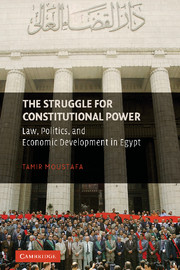Book contents
- Frontmatter
- Contents
- List of Figures and Tables
- Acknowledgments
- 1 Introduction: Law versus the State
- 2 The Politics of Domination: Law and Resistance in Authoritarian States
- 3 The Establishment of the Supreme Constitutional Court
- 4 The Emergence of Constitutional Power (1979–1990)
- 5 The Rapid Expansion of Constitutional Power (1991–1997)
- 6 Executive Retrenchment and an Uncertain Future (1998–2005)
- 7 Law, Development, and Democracy: A Critical Appraisal
- APPENDIX A SCC Justices and Commissioners
- APPENDIX B The Egyptian Constitution
- APPENDIX C Law 48 of 1979 Governing the Operations of the Supreme Constitutional Court of Egypt
- APPENDIX D Figures on Supreme Constitutional Court Rulings
- Bibliography
- Index
6 - Executive Retrenchment and an Uncertain Future (1998–2005)
Published online by Cambridge University Press: 27 July 2009
- Frontmatter
- Contents
- List of Figures and Tables
- Acknowledgments
- 1 Introduction: Law versus the State
- 2 The Politics of Domination: Law and Resistance in Authoritarian States
- 3 The Establishment of the Supreme Constitutional Court
- 4 The Emergence of Constitutional Power (1979–1990)
- 5 The Rapid Expansion of Constitutional Power (1991–1997)
- 6 Executive Retrenchment and an Uncertain Future (1998–2005)
- 7 Law, Development, and Democracy: A Critical Appraisal
- APPENDIX A SCC Justices and Commissioners
- APPENDIX B The Egyptian Constitution
- APPENDIX C Law 48 of 1979 Governing the Operations of the Supreme Constitutional Court of Egypt
- APPENDIX D Figures on Supreme Constitutional Court Rulings
- Bibliography
- Index
Summary
“Isn't amending the Constitution so easy that it can be done overnight?”
“Yes, in Egypt it can take place in a second.”
Question-and-answer session at a lecture by former Chief Justice ‘Awad al-Murr at Cairo University, September 25, 2000By the late 1990s, the Egyptian government was increasingly apprehensive about Supreme Constitutional Court activism. In less than two decades of operation, the SCC had become the most important avenue for political activists to challenge the regime, and the Court continued to issue scores of rulings that incrementally undermined the regime's levers of control. Egyptian human rights groups were exposing the repressive nature of the government both at home and abroad, and rights groups had begun to formalize their strategies of constitutional litigation. By 1998, rights groups were raising dozens of petitions for constitutional review every year. Intent on reasserting its authority, the regime steadily tightened its grip on the SCC, the human rights movement, and opposition parties in the late 1990s.
This chapter examines the fall of Supreme Constitutional Court independence between 1998 and 2005. In this period, the SCC and its judicial support network attempted to stave off political retrenchment by mobilizing on behalf of one another. Early challenges to the Supreme Constitutional Court generated resistance from opposition parties, human rights groups, professional syndicates, and the legal profession. Likewise, the SCC played a crucial role in defending the human rights movement and opposition parties with two of its boldest rulings: one against the government's repressive 1999 NGO law and another that required full judicial supervision of elections.
- Type
- Chapter
- Information
- The Struggle for Constitutional PowerLaw, Politics, and Economic Development in Egypt, pp. 178 - 218Publisher: Cambridge University PressPrint publication year: 2007



